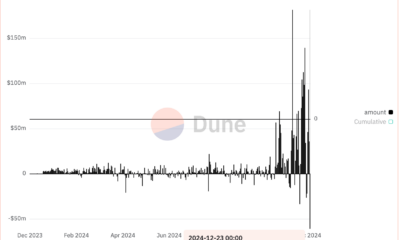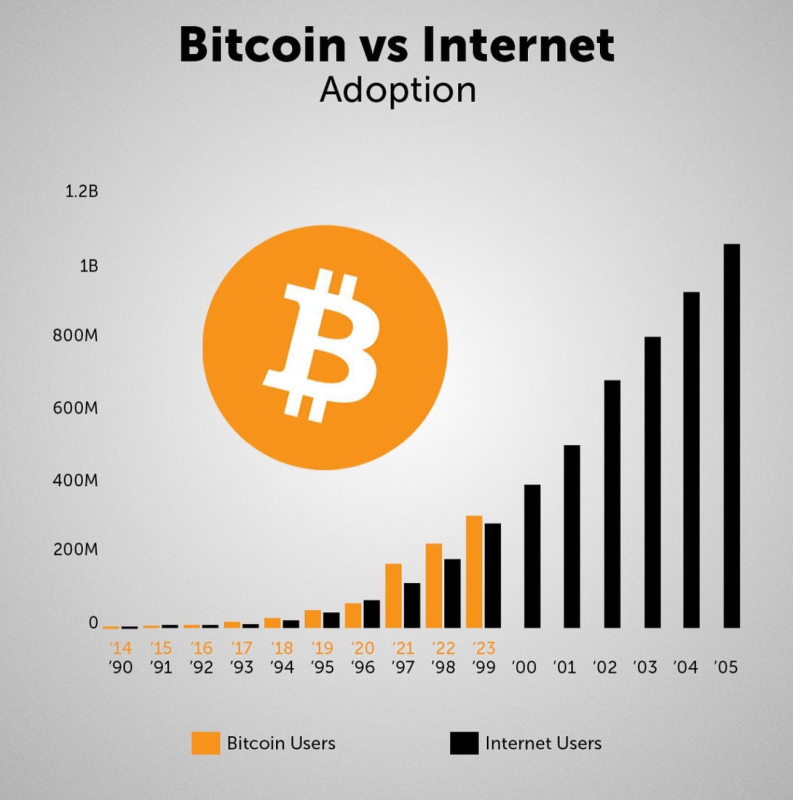Culture
Bitcoiners and Wobblies: Labor Day Edition
Published
4 months agoon
By
admin

Recently, I’ve been reading about the foundations of the American Labor Movement. Specifically, the birth of the Industrial Workers of the World and a group called the Wobblies, a nickname given to IWW Members. At its peak, the IWW had over 150,000 members in 1917, with global memberships and significant power and influence. While the IWW was a socialist leaning organization in theory, many of its core values were intertwined into the DNA of the American Labor movement, and was undeniably pivotal to the development of organized labor and a strong working class following the industrial revolution. The parallels between some of the IWW’s origins and ideologies and Bitcoin are significant, and shall be demonstrated with quotes rather than boring you to death with in depth history.
All quotes are attributed to the book “Wobblies: A Graphic History of The Industrial Workers of the World (Buhle/Schulman.
Origins and Genesis
“No one can say exactly where the inspiration for the IWW came from. The origins are too numerous both in the U.S. and abroad…”
Similarly, the nickname of the Wobblies, has no clear origin. Naturally, some of the mythology around Bitcoin comes to mind, and while Bitcoin’s origins are clearly documented via white paper and email communications, its creator or creators is or are shrouded in mystery. As Bitcoin caught gained popularity, its growth was decentralized and organic. In another parallel, while the IWW and American Labor Movement had prior inspirations, it was a pioneer in the sense of organizing labor across ethnic, gender, religious and other demographic differences.
“After the Civil War, massive industry grew up faster than anyone could have imagined, with previously unthinkable wealth accruing to the bankers but with millions of desperately poor working people, employed at low wages or unemployed in the frequent economic recessions”
From the financial crisis, to post-covid wealth accumulation within the ranks of billionaires, to a current AI, robotics and self-automation boom underway, this story is all too familiar. However, recessions have been all but outlawed, replaced by government intervention, currently placing systems as large as Pensions and Social Security on the equivilant of government welfare and dependence.
Wobblies and Bitcoiners
“The Wobbly, male or female, Asian or Occidental, black, brown, red or white, was only an ordinary human being in physique”
We feel the same about Bitcoiners. We have all met some of the most inspiring people in our lives in this space. It is both the character, grit and determination that allows individuals to discover and understand Bitcoin, as well as the character building journey a Bitcoiner must take to fully grasp Bitcoin and share it with a world that rounds out what many of us believe is the most talented and motivated communities in the world.
“Their story was collaborative, collective, not reliant on any one hero or heroine-as heroic (or tragic) as individual Wobblies lives might be.”
Kill your heroes. Death to Ego. Bitcoin doesn’t need any of us.
Solidarity: A movement greater than the individual
“The world of the Wobblies was one realized in its best moments by solidarity across race, ethnic, gender and nationality lines”
The beauty of Bitcoin is it requires no trust between those who transact with each other. And in doing such, Bitcoin allows humans to deconstruct the daily head to toe analysis we perform on each other daily; an analysis that instinctually calls out our differences, with roots in paranoia and fear. While blind solidarity amongst Bitcoiners is the antithesis of “dont trust, verify,” there is a strong natural bond between Bitcoiners. I believe the future of Bitcoin, when facing its largest tests ahead, will very much depend upon a deepened solidarity between those who subscribe to Bitcoin’s Genesis, core values, and blind commitment to being honest, true and trustless.
AFL vs. Knights of Labor
“The earliest mass movement for an eight hour workday during 1885-86, highlighted the different roles of two kinds of labor movements. The American Federation of Labor, founded in 1883, sought to organize skilled workers (almost entirely white and male) only…whereas the Knights of Labor, founded in 1869 as a secret society..extended its membership to almost all workers (except Chinese), including African-Americans and women.”
The AFL and its exclusive country club brand of membership outlasted the ultimate demise of the Knights of Labor and still exists today as the AFL-CIO. In reading about the different philosophies of the AFL and Knights of Labor it brings up parallels within the Bitcoin community, frequently heard criticisms of Bitcoin Maxi’s, as well as Bitcoin v. Crypto. I leave you the reader to draw your own thoughts here, as parallels are in their nature loose affiliations at best.
The Movement
“In the industrially advanced United States, the working class had been prepared ready to assume control of society and to replace “politics” and the “State” with a government of direct rule. As Marx had pointed out about the Paris Commune (and Lenin would repeat for the Soviets), the existing government apparatus could not be infiltrated and taken over piece-meal; it had to be dissolved and repalced by a truly democratic, modern form of government”
There are two camps of thought in Bitcoin, one that calls for a full collapse of the current financial system, and migration to a Bitcoin Standard, and another that insists Bitcoin can co-exist with and even surpass the current financial system without the latters’ collapse. While money is not identical to government in this parallel, the amount in which money is entrenched in the legacy financial system, is prodigious, and this always sparks interesting debate between Bitcoiners.
“For the IWW..the familiar problem of the socialist movement being notoriously small in the US could be solved in a new way. ‘Educating’ workers into becoming socialists, through newspapers, speeches and election campaigns, was too passive and not very successful. Workers needed to educate themselves, in and through their own actions and self-organization.”
Some opposing parallels here. Immediately, I think of a core value of Bitcoiners, which is that, no one can walk this path for you. Proof of Work can not be sidestepped or bypassed. No individual or group can cheat the quest for knowledge, both about Bitcoin and the system it sits poised to replace. The Bitcoin journeys of individuals and membership-based orgs, absent continuous learning and education, often end up in loss or disappointment. Those who do the work, find that their knowledge of money blossoms, and few if any have ever turned back after coming to deeply understand Bitcoin.
Simultaneously, my mind shifts to the oligarchy’s attempts at no less than a 10 year negative media blitz on all things Bitcoin. It slowed the train but it did not work. The other day, I randomly asked people at the 3rd Street promenade in Santa Monica, to share their thoughts on Bitcoin. Overwhelmingly positive, and having some foundation in accuracy. The movement to dissuade people from finding Bitcoin was a delay of the inevitable at best. Because nothing can stop an idea whose time has come.
Conclusions
On this labor day, I gaze upon the deeply polarized two party political system of the dominant world power today. And as I see labor unions align with one party, at the expense of creating division within their ranks, I see a labor movement that has drifted from its original foundation. While the IWW rose and fell, its pinnacle represented an unwavering movement, a solidarity and commitment to the worker above everything else. And there is power in that. I see parallels today in Bitcoin.
The core principles of Bitcoin transcend our differences and are worth fighting for. At Proof of Workforce, our method of fighting for these values is through education-based Bitcoin adoption for workers, unions, pension funds and municipalities. And in doing so, we are sharing not just bitcoin the asset, or Bitcoin the Network, we are communicating the Genesis of Bitcoin and its values, so that they may not be lost in the progression of time.
Finally, Bitcoin is a natural evolution of the labor movement, sharing many similarities and parallels. However, unlike the labor movement, the worker can rely on Bitcoin, absent any allegiance to any political party, leader or oligarchy. And in this sense, Bitcoin and its system of values stands to be adopted by unions all over the world. And in doing so, unions around the world can become re-aligned to their Genesis Story. A story where solidarity comes above all, a story where workers come together to hold onto the very productive property dependent upon their labor. A story where, as many workers stand to be phased out of relevance due to automation and AI, the unions representing them look forward and claim ownership of the most accessible and promising productive property available to them today; Bitcoin.
This is a guest post by Dom Bei. Opinions expressed are entirely their own and do not necessarily reflect those of BTC Inc or Bitcoin Magazine.
Source link
You may like


Most Layer 2 solutions are still struggling with scalability


Here’s why Stellar Price Could Go Parabolic Soon


Perp-Focused HyperLiquid Experiences Record $60M in USDC Net Outflows


Experts say these 3 altcoins will rally 3,000% soon, and XRP isn’t one of them


Robert Kiyosaki Hints At Economic Depression Ahead, What It Means For BTC?


BNB Steadies Above Support: Will Bullish Momentum Return?


The Islamic conceptualisation of finance is built around a set of core principles which give primacy to honesty, fairness and accountability in trade and transactions. As such, Islamic finance seeks uphold justice, transparency, and shared prosperity in economic systems. Arguably, fiat currency achieves the exact opposite of these principles, since it introduces uncertainty, speculation and inequities that punish the poor, who earn and spend fiat, and favours the rich who invest in assets that benefit from inflation. In this backdrop, Bitcoin emerges as a solution that aligns remarkably well with Islamic finance principles. This article explores why Bitcoin, with its decentralization, transparency, and scarcity, represents the most Islamic form of money, offering transformative potential for the Muslim world.
The foundational principles of Islamic finance include:
1. Prohibition of Riba (Usury):
Interest-based lending, where money generates money without productive activity, is strictly forbidden in Islam. Riba fosters exploitation, concentrates wealth, and undermines social equity.
2. Prohibition of Gharar (Uncertainty):
Transactions should be free from undue speculation or ambiguity. Clear terms and honest practices are paramount.
3. Asset-Backed Economy
Trade and transactions should involve tangible assets or productive activities. Wealth must be earned through legitimate means, not through gambling or speculative bubbles.
4. Risk Sharing
Islamic finance emphasizes equity-based partnerships where profit and loss are shared, ensuring mutual benefit and fairness in all financial dealings.
5. Justice and Equity:
Wealth distribution should serve societal needs, promoting fairness and reducing economic disparities.
One could very credibly argue that the current fiat-based monetary system flagrantly violates these tenets. Central banks set interest rates that underpin the entire fiat system, institutionalizing usury. Money created out of debt inherently generates unearned profits for lenders while indebting others, fostering exploitation and inequality. The fiat system disproportionately benefits those closest to the source of money creation (e.g., banks, governments) at the expense of ordinary people. This “Cantillon Effect” exacerbates wealth inequality, violating Islamic values of equity and justice.
Fiat currencies are prone to inflation and devaluation due to their unlimited supply. This creates uncertainty and speculative behaviour, further destabilizing economies and harming the most vulnerable. Unlike gold or tangible assets, fiat money is not backed by any physical commodity. It is merely a promise of value, eroding trust and violating Islam’s emphasis on tangible, asset-backed wealth. Centralized control of money by a few institutions undermines accountability, fosters corruption, and allows governments to manipulate currencies to serve political agendas, often to the detriment of their citizens. These systemic flaws have led to financial crises, inequality, and the erosion of societal trust.
Bitcoin, the world’s first decentralized digital currency, aligns closely with the ethical and economic teachings of Islam. Bitcoin operates without interest-based mechanisms. Its decentralized nature ensures that no central authority can create money out of thin air or profit unjustly through usury. Every Bitcoin transaction is recorded on an immutable public ledger, the blockchain. This ensures honesty and accountability, eliminating the uncertainty associated with opaque fiat systems.
Bitcoin’s supply is capped at 21 million coins, making it a deflationary asset. Its scarcity mirrors the attributes of gold, historically accepted as sound money in Islamic societies. Unlike fiat money, Bitcoin is not controlled by any government or institution. Its decentralized network empowers individuals and fosters equity, aligning with Islam’s emphasis on justice and fairness.
Bitcoin is not a speculative promise; it is earned through “proof-of-work,” which requires significant energy and computational effort. This tangible cost of production imbues it with intrinsic value, resonating with Islamic financial principles. Bitcoin allows anyone with an internet connection to participate in the global economy. This inclusivity aligns with Islam’s vision of reducing economic barriers and promoting universal access to financial resources. Through its adherence to these principles, Bitcoin offers a viable alternative to the exploitative fiat system, paving the way for a more just and equitable financial future.
Adopting Bitcoin on a wide scale could revolutionize the Muslim world, unlocking unprecedented economic opportunities. Many Muslim-majority countries suffer from chronic inflation, eroding the value of their fiat currencies and impoverishing their citizens. Bitcoin’s deflationary nature provides a hedge against inflation, preserving wealth over time. Millions of Muslims remain unbanked due to lack of access to traditional financial services. Bitcoin’s decentralized system allows individuals to store and transfer wealth securely without relying on banks, fostering economic empowerment. Muslim-majority countries are among the largest recipients of remittances. Bitcoin enables faster, cheaper, and more secure cross-border transactions, reducing reliance on costly intermediaries.
By decentralizing money creation and eliminating the privileges of central banks, Bitcoin ensures a fairer distribution of wealth, addressing economic disparities that plague many Islamic societies. Bitcoin’s transparent system facilitates the development of Shariah-compliant financial products and services, promoting ethical investment opportunities in line with Islamic values. Bitcoin enables nations to reduce their dependence on the US dollar and other foreign currencies, strengthening their economic sovereignty and resilience. By enabling trustless, borderless transactions, Bitcoin fosters trade within the global Muslim community, encouraging innovation and economic integration across nations.
Bitcoin is more than just a technological innovation; it is a financial system rooted in justice, transparency, and equity—values deeply embedded in Islamic teachings. As the Muslim world grapples with the challenges of fiat-based economies, Bitcoin offers a path toward economic independence, financial inclusion, and societal prosperity. By embracing Bitcoin, the Muslim world can align its financial systems with the timeless principles of Islam, paving the way for a fairer and more sustainable future.
This is a guest post by Ghaffar Hussain. Opinions expressed are entirely their own and do not necessarily reflect those of BTC Inc or Bitcoin Magazine.
Source link
2024 Election
Bitcoin is Neither Racist, Xenophobic, nor Misogynistic: A Response to Ideological Stereotyping
Published
4 weeks agoon
November 27, 2024By
admin

Just hours after the U.S. election results were announced, I received messages from friends filled with striking assumptions. Some congratulated me, mockingly saying, “Congrats, your side won for Bitcoin.” Others expressed disapproval with remarks like, “It’s pathetic!” and “I’m shocked that Americans just voted for Hitler.” One friend said, “You were lucky to find safety in the U.S. as a refugee under Biden’s administration. Refugees and asylum seekers will now face a harder time here, but, hey, it’s still good for your Bitcoin.” Many of these friends work in high-level corporate jobs or are university students.
As a Green Card holder, I was not eligible to vote, but I recognize their huge disappointment in seeing their preferred candidate lose. Their frustrations were directed at me because they know I support Bitcoin and work in the space. I understand that making me a scapegoat says less about me and more about their limited understanding of what Bitcoin’s value represents.
I’m aware that in this highly polarized political landscape, ideological stereotyping becomes evident—not only during election season but also in spaces where innovative thinking should be encouraged. A prime example of this ideological bias occurred during the Ohio State University commencement, where Chris Pan’s speech on Bitcoin was largely booed by students attending their graduation ceremony. I admire the courage it took to stand firm in front of over 60,000 people and continue his speech. My guess is that most of these graduating students have never experienced hyperinflation or grown up under authoritarian regimes, which likely triggered an “auto-reject”’ response to concepts beyond their personal experience.
I’ve encountered similar resistance in my own unfinished academic journey; during my time at Georgetown, I had several unproductive conversations with professors and students who viewed Bitcoin as a far-right tool. Once a professor told me, “Win, just because cryptocurrency (he didn’t use the term Bitcoin) helped you and your people in your home country doesn’t make it a great tool—most people end up getting scammed in America and many parts of the world. I urge you to learn more about it.” The power dynamics in academic settings often discourage open-minded discourse, which is why I eventually refrained from discussing Bitcoin with my professors.
I’ve learned to understand that freedom of expression is a core American value. Yet, I’ve observed that certain demographics or communities label anyone they disagree with as ‘racist.’ In more extreme cases, this reaction can escalate to using influence to have people fired, expelled from school, or subjected to coordinated cyberbullying. I’m not claiming that racism doesn’t exist in American society or elsewhere; I strongly believe both overt and subtle forms of racism still persist and are well alive today.
Although bias and inequality remain widespread, Bitcoin operates on entirely different principles. Bitcoin is borderless, leaderless, and accepting of any nationality or skin color all while without requiring any form of ID to participate. People in war-torn countries convert their savings into Bitcoin to cross borders safely, human rights defenders receive donations in Bitcoin, and women living under the Taliban get paid through the Bitcoin network.
Bitcoin is not racist because it is a tool of empowerment for anyone who is willing to participate. Bitcoin is not Xenophobic because it gives those forced to flee their homes the power to carry their hard-earned economic energy across borders and participate in another economy when every other option is closed. For activists, often branded as ‘criminals’ by authoritarian regimes, it supports them through frozen bank accounts and blocked resources. For women, enduring life under misogynistic rule, Bitcoin offers a rare chance for financial independence.
Going back to the U.S. election context, Bitcoin not only levels the playing field for people in the world’s most forgotten places and darkest corners, but it also opens new avenues for U.S. presidential candidates to engage with this growing community. President-elect Donald Trump has made bold promises regarding Bitcoin, signaling a favorable policy. In contrast, Democratic candidate Vice President Kamala Harris’s campaign reportedly declined to support the Bitcoin community. Grant McCarty, co-founder of the Bitcoin Policy Institute, stated, “Can confirm that the Harris campaign was offered MILLIONS of dollars from companies, PACs, and individuals who were looking for her to simply take meetings with key crypto stakeholders and put together a defined crypto policy plan. The campaign never took the industry seriously.” I believe this is something most people may be unaware of, and confirmation bias often leads to the assumption that all Bitcoin supporters back every policy of the other side, including potential drastic changes to America’s humanitarian commitments such as refugee resettlement and asylum programs, anti-trafficking and protection of vulnerable populations, and foreign aid and disaster relief.
Most people around the world lack a stable economic infrastructure or access to long-term mortgages; they live and earn with currencies more volatile than crypto gambling and, in some cases, holding their own fiat currency is as dangerous as casino chips, or worse.
The Fiat experiment has failed the global majority. I believe that Bitcoin and Bitcoin advocates deserve to be evaluated on their merits and work on global impact, rather than through the binary lens of political bias, misappropriated terms, or factually flawed yet socially accepted diminutive categorizing, which allows them to opt out of learning and evaluating assumptions.
This is a guest post by Win Ko Ko Aung. Opinions expressed are entirely their own and do not necessarily reflect those of BTC Inc or Bitcoin Magazine.
Source link

Today’s modern Bitcoin exchanges have drastically improved access to Bitcoin ownership in 2024. Gone are the days of janky peer-to-peer (P2P) trade forums and questionably secure early exchanges like Mt Gox. Instead, a legion of Bitcoin on-ramps focused on superior security and user experience (UX) has made purchasing your first Bitcoin a breeze. Many of these services have even embarked on education-focused initiatives to encourage greater adoption during Bitcoin’s most recent bear market. In November 2023 Swan launched Welcome to Bitcoin, their free introductory 1 hour course about Bitcoin. In December 2023, Cash App released BREAD, a free, limited-edition magazine that uses design to tell stories and educate readers about Bitcoin in a relatable and accessible way.
What these initiatives show is that Bitcoin adoption is approaching a turning point. These two major Bitcoin exchanges, along with the industry as a whole, are discovering that easy access to a smash buy button does not guarantee purchase. Numerous barriers to entry still exist for nocoiners, which provide significant constraints to understanding Bitcoin, and thus throttle Bitcoin’s growth and adoption. As we approach a steeper incline in Bitcoin’s bell curve, throwing novices into exchange apps without sufficient education and cultivation is no longer a strategy for success.
What once was a far simpler task of energizing early adopters and cypherpunks around Bitcoin’s clear value proposition, is evolving into a more complex and convoluted process of orange-pilling the early majority of future Bitcoin holders. This, we hope, will then lead to widespread Bitcoin mass adoption as society en masse chooses to store its time and energy in the best money ever created. For this hyperbitcoinization to occur, more people need to understand the intricacies of Bitcoin. This is easier said than done because Bitcoin still has an education problem:
- An Economist Intelligence Unit study reported that 51% of people said a lack of knowledge is the main barrier to Bitcoin ownership.
- A YouGov survey found that 98% of novices don’t understand basic Bitcoin concepts.
- A nationwide survey from the Yale Center discovered that 69% of young people find learning boring.
This research outlines the struggle of onboarding and educating the next generation of Bitcoiners, most notably younger generations who have been shown to possess a limited attention span of 8 seconds. For inspiration to help solve this problem, we can look at one of the most popular mobile games of all time… Pokémon GO.
Pokémon GO was and remains to be, a global phenomenon. This beloved app caught the attention of Gen-Z, millennials, and Gen-X alike, boasting record-breaking engagement stats:
- In 2016, the game peaked at 232 million active players.
- Pokémon GO has grossed over $6 billion in revenue.
- In 2024, 24% of 18–34-year-olds in the US are playing Pokémon GO, while 49% of 35–54 year-olds are playing.
We at Jippi believe that the success of this award-winning game can illuminate the path forward for Bitcoin adoption. So we have set upon the electrifying task of building Tribe Clash–the world’s first Pokémon GO-inspired Bitcoin education game. The rules are simple, create or join a Tribe and battle for dominance over a city with your friends by catching a Bitcoin-themed Beast in every Territory.
Each week Jippi will release a new Territory to be claimed. A Tribe member will explore that Territory with their phone, where they will discover a Bitcoin Beast to catch. If they successfully answer all Bitcoin quiz questions correctly the fastest, they will then catch that beast. The Tribe with the most Territories and Bitcoin Beasts at the end of the game will win $30k worth of Bitcoin to be dispersed equally to each Tribe member.

Our vision is for Jippi to become the largest, most popular platform for beginners to gather, educate, and accumulate Bitcoin. We see Jippi as the most accessible on-ramp into the industry, where we can educate a whole new generation of Bitcoiners from novices to experts by lowering the barrier to entry.
You can support the development of Tribe Clash by contributing to our crowdfunding campaign on Timestamp. Timestamp enables investors of all backgrounds to support Bitcoin-only companies and make an impact. Our campaign is open to both the general public and accredited investors, so we would love for you to join us on this journey.
This is a guest post by Oliver Porter. Opinions expressed are entirely their own and do not necessarily reflect those of BTC Inc or Bitcoin Magazine.
Source link

Most Layer 2 solutions are still struggling with scalability

Here’s why Stellar Price Could Go Parabolic Soon

Perp-Focused HyperLiquid Experiences Record $60M in USDC Net Outflows

Experts say these 3 altcoins will rally 3,000% soon, and XRP isn’t one of them

Robert Kiyosaki Hints At Economic Depression Ahead, What It Means For BTC?

BNB Steadies Above Support: Will Bullish Momentum Return?

Metaplanet makes largest Bitcoin bet, acquires nearly 620 BTC

Tron’s Justin Sun Offloads 50% ETH Holdings, Ethereum Price Crash Imminent?

Investors bet on this $0.0013 token destined to leave Cardano and Shiba Inu behind

End of Altcoin Season? Glassnode Co-Founders Warn Alts in Danger of Lagging Behind After Last Week’s Correction

Can Pi Network Price Triple Before 2024 Ends?

XRP’s $5, $10 goals are trending, but this altcoin with 7,400% potential takes the spotlight

CryptoQuant Hails Binance Reserve Amid High Leverage Trading

Trump Picks Bo Hines to Lead Presidential Crypto Council

The introduction of Hydra could see Cardano surpass Ethereum with 100,000 TPS
182267361726451435

Why Did Trump Change His Mind on Bitcoin?

Top Crypto News Headlines of The Week

New U.S. president must bring clarity to crypto regulation, analyst says

Will XRP Price Defend $0.5 Support If SEC Decides to Appeal?

Bitcoin Open-Source Development Takes The Stage In Nashville

Ethereum, Solana touch key levels as Bitcoin spikes

Bitcoin 20% Surge In 3 Weeks Teases Record-Breaking Potential

Ethereum Crash A Buying Opportunity? This Whale Thinks So

Shiba Inu Price Slips 4% as 3500% Burn Rate Surge Fails to Halt Correction

Washington financial watchdog warns of scam involving fake crypto ‘professors’

‘Hamster Kombat’ Airdrop Delayed as Pre-Market Trading for Telegram Game Expands

Citigroup Executive Steps Down To Explore Crypto
Mostbet Güvenilir Mi – Casino Bonus 2024

NoOnes Bitcoin Philosophy: Everyone Eats
Trending

 3 months ago
3 months ago182267361726451435

 Donald Trump5 months ago
Donald Trump5 months agoWhy Did Trump Change His Mind on Bitcoin?

 24/7 Cryptocurrency News4 months ago
24/7 Cryptocurrency News4 months agoTop Crypto News Headlines of The Week

 News4 months ago
News4 months agoNew U.S. president must bring clarity to crypto regulation, analyst says

 Price analysis4 months ago
Price analysis4 months agoWill XRP Price Defend $0.5 Support If SEC Decides to Appeal?

 Opinion5 months ago
Opinion5 months agoBitcoin Open-Source Development Takes The Stage In Nashville

 Bitcoin5 months ago
Bitcoin5 months agoEthereum, Solana touch key levels as Bitcoin spikes

 Bitcoin5 months ago
Bitcoin5 months agoBitcoin 20% Surge In 3 Weeks Teases Record-Breaking Potential




